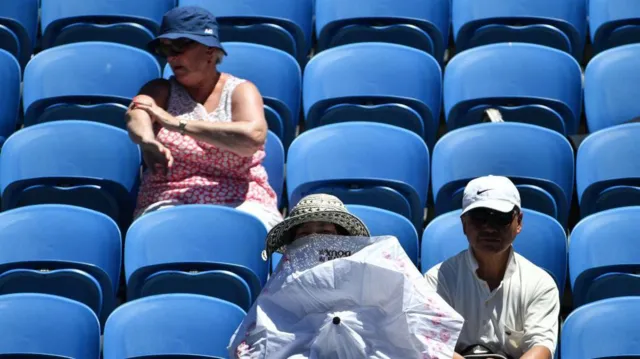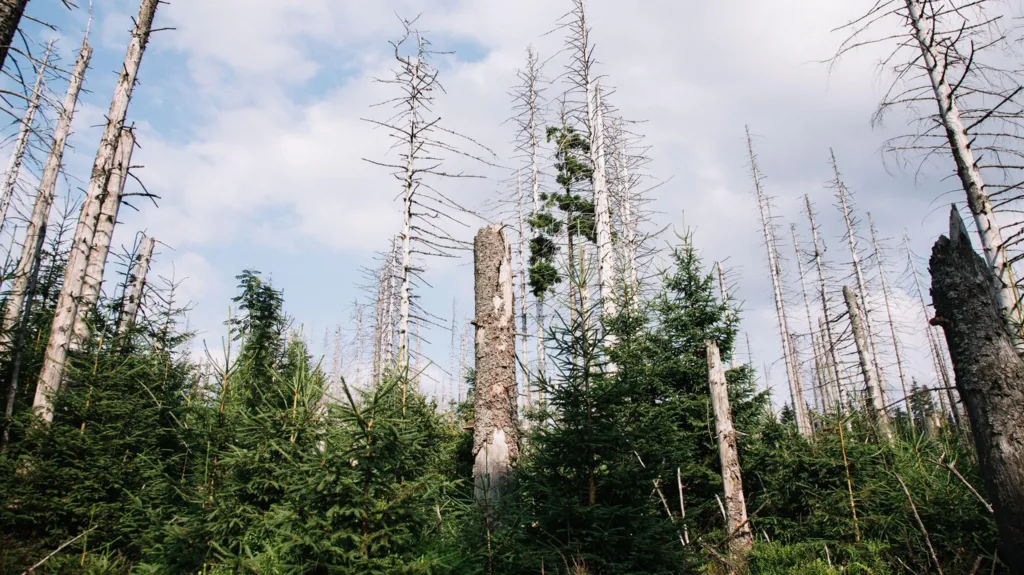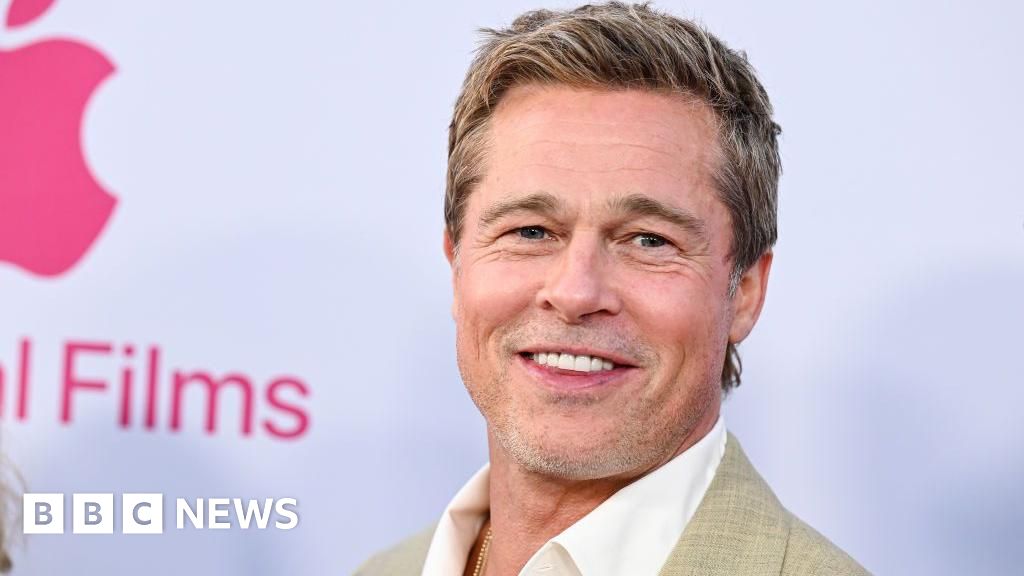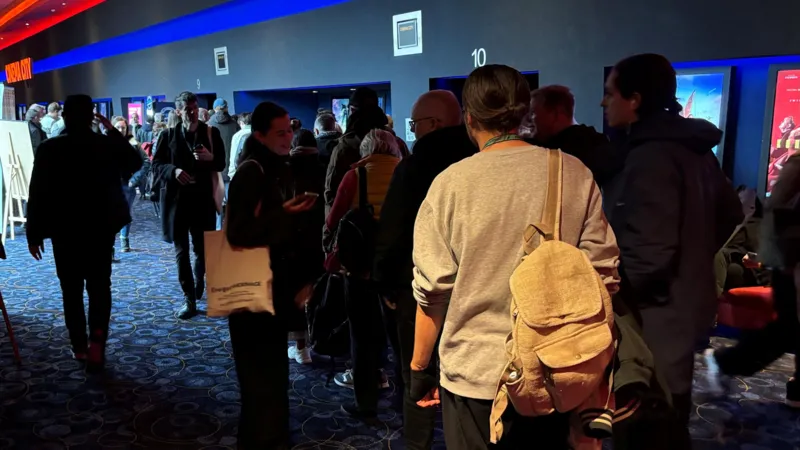Tabby Wilson and Tiffanie TurnbullBBC News, Sydney
 Marianna Massey/Getty Images
Marianna Massey/Getty ImagesLike many Australians, Rach grew up “terrified of the sun” in the country with the highest rates of skin cancer in the world.
Her childhood was characterised by the infamous “no hat, no play” rule that is commonplace in Australian schools, 90s advertisements that warned the sun would give you cancer, and sunscreen tubes that stood guard at every door in her home.
It made the now 34-year-old the kind of person who religiously applies sunscreen multiple times a day and rarely leaves the house without a hat.
So she was shocked when doctors found a skin cancer on her nose during a check last November, something they said was abnormal given her age and ray-dodging regime.
Though technically classified as a “low grade” skin cancer – a basal cell carcinoma – it had to be surgically removed, leaving the Newcastle mum with a scar just below her eye.
“I was just confused, and I was a little bit angry because I was like, ‘Are you kidding me?'” Rach – who asked that her surname not be used – told the BBC. “I thought I’d done all the right stuff and it still happened to me.”
That rage grew when she learned the sunscreen she had been using for years was unreliable and, according to some tests, offered next to no sun protection at all.
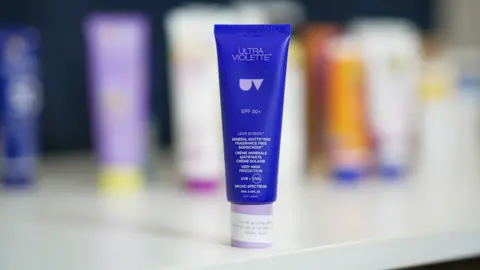 ABC News/Billy Cooper
ABC News/Billy CooperIndependent analysis by a trusted consumer advocacy group has found that several of Australia’s most popular, and expensive, sunscreens are not providing the protection they claim to, kicking off a national scandal.
There has been a massive backlash from customers, a probe launched by the country’s medical watchdog, multiple products pulled from shelves, and questions raised about the regulation of sunscreen around the globe.
“It’s definitely not an issue isolated to Australia,” cosmetic chemist Michelle Wong told the BBC.
The reckoning
Australians have a complicated relationship with the sun: they love it, but they also fear it.
Effective public health messaging – which has drilled “Slip, Slop, Slap” into their heads – competes with a beauty culture which often idolises bronzed skin.
The country has the highest incidence of skin cancers in the world and it is estimated that two out of three Australians will have at least one cut out in their lifetime.
So when Choice Australia released its damning report in June, it immediately made waves. The group had tested 20 sunscreens in an independent accredited Australian lab, finding 16 did not meet the SPF, or skin protection factor, rating listed on the packet.
Ultra Violette’s Lean Screen SPF 50+ Mattifying Zinc Skinscreen, a facial product that Rach says she used exclusively, was the “most significant failure” identified. It returned a result of SPF 4, something that shocked Choice so much it commissioned a second test that produced a similar reading.
Other products that did not meet their SPF claims included those from Neutrogena, Banana Boat, Bondi Sands and the Cancer Council – but they all rejected Choice’s findings and said their own independent testing showed their sunscreens worked as advertised.
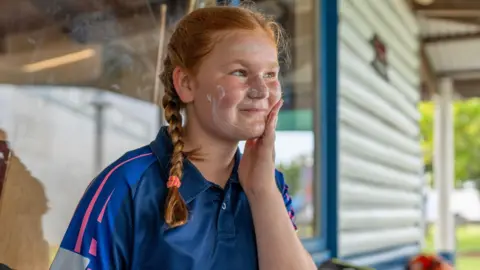 Getty Images
Getty ImagesThe uproar was immediate for the brands named in the report, and also prompted a swift response from the Therapeutic Goods Association (TGA), which said it would investigate the findings and “take regulatory action as required”.
Ultra Violette bit back, saying they were “confident that Lean Screen is safe and effective” and detailing extensive testing of the product – which has been sold in almost 30 countries, including the UK, and retails for upwards of A$50 (£24, $33).
But less than two months later, it announced that Lean Screen would be recalled after it returned inconsistent results across eight different sets of lab testing.
“We are deeply sorry that one of our products has fallen short of the standards we pride ourselves on and that you have come to expect of us,” read a statement published to the brand’s Instagram account.
It added that it has “since ended the relationship with the initial testing lab”.
In the past fortnight, other brands have “paused” the sale of at least four more products, none of which were included in the Choice report.
Rach knows there is no way to prove that there is a link between her diagnosis and the brand of sunscreen she relied on. She says she is not alleging there is such a connection.
But she said Ultra Violette’s response to the scandal was like “a kick in the guts”.
She felt that they took no real accountability for the pitfalls of their product, and was let down by their decision to continue selling it for two months despite doubts over its efficacy.
“I just had like the five stages of grief, you know?” she said. “I was angry, I was upset, I was almost in denial.”
Like Rach, a horde of annoyed customers say the saga has shaken their faith in the industry.
“A refund isn’t really going to reverse years of sun damage, is it?” one wrote in response to Ultra Violette’s recall statement.
A spokesperson told the BBC Ultra Violette had retested all its other products and confirmed their SPF ratings.
“We were the first, and currently the only of the 16 products that failed Choice’s test to not just pause sales but withdraw the product all together, prioritising safety, and giving customers access to refunds and a product voucher,” they said in a statement.
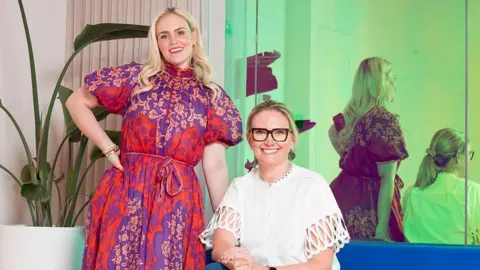 Getty Images
Getty ImagesThe Ultra Violette spokesperson added that the brand was working with the TGA and others to make sure this moment of reckoning isn’t wasted.
“We are committed to doing our part in driving this category forward.”
Choice has urged the TGA to conduct further investigations into the sunscreen market, and also urged any brands who had reason to question the SPF protection listed on their products to remove them from sale immediately.
“It is clear there is a serious issue in the Australian sunscreen industry that urgently needs to be addressed,” said Rosie Thomas, the director of campaigns, in a statement to the BBC.
How did this happen?
While in Europe sunscreen is classed as a cosmetic, Australia regulates it as a therapeutic good – essentially a medicine – which means it is subject to some of the most robust sunscreen regulations in the world.
And that’s something many of the brands caught up in this saga trade on. So, how did this happen?
An investigation by the Australian Broadcasting Corporation found that a single US-based laboratory had certified at least half of the products that had failed Choice’s testing, and that this facility routinely recorded high test results.
It also found that several of the sunscreens pulled from shelves shared a similar base formula and linked them to a manufacturer in Western Australia.
The TGA says it does not usually speak about ongoing investigations because it does not want to compromise them, but that it is also looking into “reviewing existing SPF testing requirements” which can be “highly subjective”.
“The TGA is also aware that it is common practice for different sunscreen products to share the same or similar base formulations,” a spokesperson said in a statement to the BBC.
“Ultimately it is the sponsor’s [seller’s] responsibility to ensure that their medicine remains compliant with all applicable legislative requirements.”
Consistent and comfortable sunscreens which offer high protection are very technical and difficult to make, says Dr Wong, founder of Lab Muffin Beauty Science.
Everyone’s skin responds differently to the product, she adds, and it’s one that is almost always being stress-tested – by sweat, water, or makeup.
It is very difficult to rate effectively for the same reasons. Historically, it has been done by spreading the sunscreen on 10 people at the same thickness, then timing how long it takes for their skin to start burning both with and without the product applied.
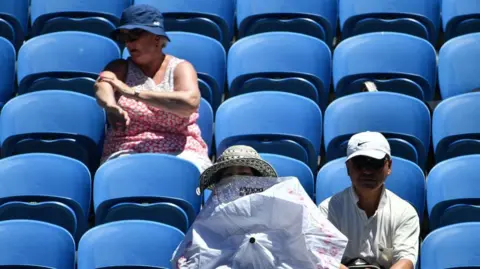 Getty Images
Getty ImagesWhile there are clear guidelines as to what you are looking for, Dr Wong says there is still a lot of variability. That is down to skin texture or tone, or even the colour of the walls, and “different labs get different results”.
But she says results are also quite easy to fake, pointing to a 2019 probe by US authorities into a sunscreen testing laboratory which resulted in the owner being jailed for fraud.
Many sunscreen brands from all over the world use the same manufacturers and testing labs – and so this issue is unlikely to be isolated to Australia, she adds.
“Until someone goes out and tests a whole bunch of sunscreens in other countries, we just don’t know the extent of it.”
She says the scandal is a reminder that regulations are only as good as they are enforced.
But while it has touched a nerve for many people who are at high risk for skin cancer simply by virtue of being Australian, Dr Wong said she felt the panic triggered by the investigation was blown out of proportion.
She points to the world’s largest clinical trial of sunscreen, done in the 90s, which found that the daily use of an SPF 16 sunscreen dramatically dropped skin cancer rates.
“95% of the sunscreens tested [by Choice] have high enough SPF to more than halve the incidence of skin cancer,” Dr Wong said.
“Some of the SPF testing, I feel, has become a bit more of a marketing exercise than a real reflection of efficacy.”
The most important thing you can do when choosing a sunscreen, she says, is actually wear enough of it – a full teaspoon at least for each part of your body, face included.
And ideally you should apply it about every two hours, especially if you have been sweating a lot or swimming.
Experts also advise that you combine the sunscreen with other safety methods, such as wearing protective clothing and seeking out shade.
